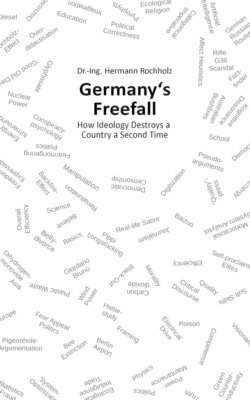Читать книгу Germany's Freefall - Hermann Dr. Rochholz - Страница 23
Organic – What’s That?
ОглавлениеOrganic – is in most cases nothing logical: First of all, you have to know that toxicity thresholds are in reality often set in a quasi arbitrary (!) manner. Sweden has high dioxin thresholds for Baltic fish. The dioxin content in the Baltic Sea is high. Organic chickens are contaminated more with dioxin than battery-caged chickens. But even this dosage can be completely neglected because nowadays everything can measured, even micro traces. These can always be found if you look hard enough.
Conversely, some people think that even the smallest amount of poison is harmful. A 2017 special issue of the German issue of “Spectrum of Science”, entitled “The Mysterious World of Poisons”, had questioned this: According to the current state of science, minimal amounts of poison have a positive effect. This can be seen, for example, in the fact that children who grow up with cats, dogs and horses have fewer allergies. Hydrogen sulfide has a healing effect. If you consume too much, it’ll be poisonous. So it’s not as simple as it seems. People have learned to live with poisons. Caffeine is the stomach poison of the coffee plant. It protects against intestinal cancer and has a mood-lifting effect.
It’s unscientific to claim the existence of “natural” and “unnatural” poisons: When the chemical formula is identical, the substance is too: The origin is irrelevant. The cultivated plants have to be sprayed with some kind of poison because the poisons that originally protected the plants against insects and fungi were “bred out” of them. So, they have to be applied externally (see also chapter “Grain, Corn and Organic Potatoes”).
That’s why prehistoric people ate much more meat because it doesn’t require stomach poisons. Most animals have other mechanisms to protect themselves from being eaten.
The advantage of organic products may be that poisons aren’t used as carelessly as in conventional cultivation. However, the disadvantage is that instead of spraying “artificial poisons”, things like copper are sprayed instead. This sounds more “natural” than “wicked chemistry”. In the long run, however, the soils will become enriched with the heavy metal copper. Metals are elements that, unlike hydrocarbons, i.e. modern poisons, can’t be broken down at all. Is this “idea” really that good?
A gastric and intestinal therapeutic agent is currently under attack. It contains celandine as its active ingredient. It’s a “natural” substance, but may, in some cases, lead to liver failure. This was known, but not mentioned on the package insert [43]. The Bayer company (producer of Roundup) probably wanted to sell it as a “natural medicine”.
You should beware of foods like stevia, soy or goji berry the next time you visit your local health food store. Their effects aren’t conclusive and humans have not had time to adapt to these substances during their evolution.
By the way, “Kamut”, a cereal that you can buy in any health food store, is a patented wheat. There’s nothing “primordial” about it because if grain were primordial it couldn’t be grown at all, as the yield would be so miserable that every organic farmer would be forced to file for bankruptcy. Organic knows marketing, too. But this does not mean that this grain is somehow “bad”.
